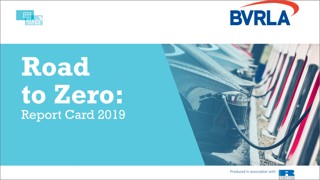Royal Mail commercial director Duncan Webb has been appointed first chairman of the British Vehicle Rental and Leasing Association’s (BVRLA) new fleet committee.
BVRLA announced its intention to open membership to end-user fleets a year ago (Fleet News, October 14, 2018) and the committee, introduced earlier this year, marks the next step in its plans to engage and involve fleets in its lobbying activities.
Jay Parmer, current BVRLA director of policy and membership (see panel), said the move would strengthen the association’s ability to present industry issues to Government and policy advisors while also helping to shape its own agenda.
“We already do lobbying work and we represent the customer base in our work,” he said. “So the obvious thing is why don’t they help to shape that policy. It’s a natural evolution and means we don’t have to rely on third party information from members. It sharpens up our messaging.”
The fleet committee is targeting a group of 10-15 “good quality” companies who will be active participants in shaping and driving the agenda. It will meet quarterly.
“Good quality means proactive and engaged, but not necessarily the large companies,” said Parmar. “We want a mix of large and small to give a balanced view. We also want a good geographical spread and companies from a range of sectors.”
Work has already started in a number of areas, including on the BVRLA’s sometimes contentious fair wear and tear guides. “The fleets are helping us to improve the way they are written and laid out – the customer view gives balance and makes it more objective,” said Parmar.
The fleet committee has also met officials from the Department for Transport’s Joint Air Quality Unit to share views on a proposed air quality portal, which is under development for launch in January 2020.
Fleets gave feedback on a vehicle checker tool that allows motorists to enter their registration to see whether they will incur a charge for entering a clean air zone and on the need to have a simple-to-use centralised payment portal with the ability to check multiple vehicles at the same time.
Parmar dismissed fears that the decision to court fleets would lead to conflict with trade associations such as ACFO and Freight Transport Association (FTA), pointing out that both already had BVRLA members, such as leasing and rental companies, within their memberships.
At the time of the announcement, ACFO said it was “surprised and disappointed”, suggesting there was “bound to be conflict when an organisation attempts to represent both suppliers and customers in the same industry”.
However, Parmar said: “I believe it strengthens our voice because we can present a united view. We don’t see it as a conflict. We will be able to give the Government constructive feedback.”
He insisted that BVRLA would continue to work alongside ACFO and FTA, among others, when lobbying Government on policy.
“We can’t underestimate the power of bringing trade bodies together to lobby Government and that won’t change,” he said. “We are not retreating or isolating ourselves; it’s a pragmatic move, not empire building.”
He added: “It will also be right for us to let others lead when relevant, where they have a pool of knowledge that strengthens the voice. We all have core competencies and there are areas where there is overlap and we will work together.”
Examples of cross-association working include topics such as air quality and direct vision standards, whereas other areas, such as lease accounting rules or WLTP for vans, are being led by BVRLA.
“The fleet sector voice is not well understood; it’s the manufacturer and supplier side which has the voice. But we can accelerate the goals and aspiration for the sector; it’s an authentic voice that amplifies the message,” said Parmar.
BVRLA stresses that it doesn’t see fleet as a major revenue stream. It has kept subs low, aligned with its associate membership fees. So far, a handful of fleets have joined, although more have attended meetings.
“We have to show them where the value is; committee meetings aren’t talking shops,” Parmar said.
Following his appointment, Duncan Webb said: “The BVRLA has a long history of supporting its members and this has increasingly involved representing the voice of fleet operators. The creation of a fleet operators committee is a natural step to put the operators’ voice into their existing influencing channels with Government policymakers and also give the BVRLA a more balanced view alongside its core membership given it is an independent association. A key outcome and objective from the operators committee will be ensuring the valued work undertaken is achieved on behalf of all fleet operators in the market.”
Jay Parmar to leave BVRLA after 19 years
Jay Parmar, the driving force behind the BVRLA decision to open membership to end-user fleets, is leaving the association after 19 years.
Parmar will take up his new role as chief executive at JIB, the Joint Industry Board for the Electrical Contracting Industry, on October 1.
“I am thrilled to be given the opportunity to lead the JIB team,” Parmar said. “My focus will be to ensure that the organisation remains at the forefront of the industry’s fast pace of change; supporting members and further strengthening the value of membership.”
Thanking Parmar for his service, BVRLA chief executive Gerry Keaney said: “His contribution during the past two decades has helped to drive our industry forward and his commitment to delivering the highest industry standards has supported our members through times of unprecedented change and challenge.”





















Login to comment
Comments
No comments have been made yet.